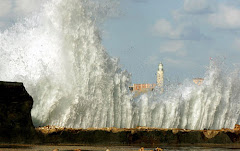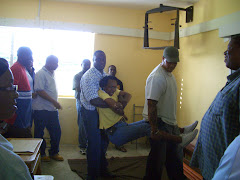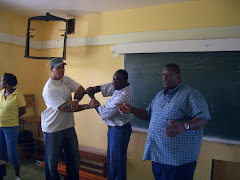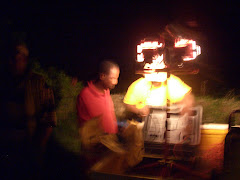
Wednesday, July 16, 2008
Communications Critical

Sanitation

- Toilet Paper
- Towelettes
- Soap, liquid detergent
- Feminine supplies
- Personal hygiene items (tootpaste etc.)
- Plastic garbage bags (for personal sanitation)
- Plastic bucket with tight lid
- Disinfectant
- Household chorine bleach
Sunday, July 13, 2008
Securing your important documents

This would be a good time to make sure that you have secured all of your important documents. These documents should be placed in a waterproof portable container:
- Will, insurance policies, contracts, deeds, share certificates
- Passports, immunization records
- Bank account numbers
- Credit card account numbers and companies
- Family records (birth, marriage, death certificates)
You should also make an inventory of valuable houshold items and important telephone numbers.
Your First Aid Kit

There are many suggestions out there for First Aid Kits. Our main purpose here is to alert you to the fact that you should be putting one together for you and your family.
If you already have one, now is the time to review it in order to review its contents. Ensure that used or expired items have been replaced. Here are some of the items that you might wish to include:
- Sterile adhesive bandages in assorted sizes
- Assorted sizes of safety pins
- Cleansing agent/soap
- Latex gloves (2 pairs)
- Sunscreen
- 2-inch sterile gauze pads (4-6)
- 4-inch sterile gauze pads (4-6)
- Triangular bandages (3)
- Non-prescription drugs (pain reliever, anti-diarrhrea medication, antacid, laxative)
- 2-inch sterile roller bandages (3 rolls)
- 3-inch sterile roller bandages (3 rolls)
- Scissors
- Tweezers
- Needle
- Moistened towelettes
- Antiseptic
- Thermometer
- Tube of petroleum jelly
Friday, July 4, 2008
In the Aftermath

Determining your priorities in the aftermath of a hurricane depends very much on your particular circumstances.
However if you and your neighbours are in no immediate danger it would be wise to keep calm and make a plan as to what your next steps should be.
If you are a member of a DEO there should be a plan that would indicate precisely what steps should be taken by members to provide assistance to your community. As long as a hurricane has an effect on Barbados it will be necessary to make an assessment of the distress of individuals within the community.
Here are a few tips to assist all of you in your planning for your family and neighbours:
- Seek medical attention for any persons that have been injured.
- Do not touch loose or dangling wires.
- Report damage to powerlines, water lines or sewers immediately.
- Do not make yourself a nuisance by insisting that utilities be returned to your area immediately, bearing in mind that there are certain essential services that have to be addressed first and that the men and women that would have to come out to work have family and neighbours just like you, who might be in need of help.
- Guard against using spoiled food if the electricity supply fails.
- Drive cautiously - debris filled streets are dangerous. Soil may be washed from beneath pavements, which might collapse under the weight of vehicles.
Thursday, July 3, 2008
Keeping Safe During the Hurricane

- Do not leave your house or shelter.
- If the eye or vortex of the hurricane is passing directly over your area, there will be a brief lull in the winds which can last from several minutes to 1/2 an hour or more. Remain in a safe place during this lull. The wind will return suddely from the opposite side with greater force.
- Your telephone usage should be reduced to a minimum, preferably only in cases of absolute necessity. You do not wish to be the victim of an electrical surge.
Wednesday, July 2, 2008
Getting Prepared

You have a responsibility to keep your family safe - both your immediate and extended family. Therefore you should make sure that you have a plan!
- Do not pay attention to rumour. Stay tuned to your radio and listen to the bulletins.
- Stay away from beaches and other low areas which can be swept away by the sea and the hurricane tides.
- If your house is out of danger from tidal waves, that is the best place to stay during a hurricane. On the other hand be prepared to move to the shelter designated in your area.
- If you are going to a shelter make sure that you have enough with you to sustain you for the duration without being excessive. Do not expect the shelter to provide anything for you.
- Fasten and secure doors and windows at your home, especially outside using good wood or hurricane shutters.
- Put away all objects that can be blown away by the wind, such as furniture, flower pots and garbage cans since they can become missiles during the course of a hurricane.
- Clean your yard.
- Stock up with food stuff which does not need to be cooked - enough for not less than three days. If there are small children make sure that there is milk to last for a similar period of time.
- Keep a supply of drinking water.
- Get a first aid kit, lanterns or gas lamps, batteries for radio and torches.
- You should make sure that you have adequate medication for the members of your family that require this.
- Have a small amount of cash with you since the Banks might not be accessible for a number of days.
- If you or any other member of your family is ill, get in touch with medical authority away before going to a shelter.
- Make sure that any important docuements are secured in a waterproof container.
- Keep a full tank of gasoleine in your car.
- Avoid taking alchoholic drinks.
Tuesday, July 1, 2008
Eye on the Weather

Tropical Weather Discussion - Tuesday, July 1, 2008
Surface weather analysis this morning showed an area of low pressure now emerging off of the coast of Africa into the far eastern Atlantic. This is the system I wrote so much of yesterday. All indications are, both from real-time data and model data, that this area of low pressure will develop into a tropical depression by Wednesday or Thursday, if not before then. Infared satellite imagery showed a burst of deep convection and is exhibiting a well-defined cyclonic circulation. Wind shear analysis and sea surface temperatures both indicate that the environment is favorable for further development of this tropical system and I do think this disturbance will be classified as a tropical depression by Wednesday or Thursday, if not before then.
All of the computer forecast guidance is showing that this system will develop over the coming days. In addition, the track models and the intensity models are showing that this system will remain in the eastern Atlantic over the next 5 days and that the system may steadily intensify over the next 5 days. After that, the global models, like the GFS and European model forecast a track well north of Puerto Rico and Virgin Islands. Model forecasts more than 5 days out should be taken with a grain of salt, so the track of this system will be watched very closely.
Ok, here are my thoughts on this system: As I have already mentioned, I do think that this system near the coast of Africa will be classified as a tropical depression by Wednesday or Thursday, if not before then. I also think it will remain on a general west to west-northwest course over the next couple of days. After that, the general course of this area of low pressure depends on its strength: This morning's steering product showed two possible scenarios. One is that if this system stays weak, a more westward path can be expected. Scenario two is that if it develops and strengthens like the models are saying, then it will move more northwestward and move well north of Puerto Rico, the Virgin Islands and the Lesser Antilles. So, needless to say I will be monitoring this system very closely over the coming days and I will keep you all updated on the latest information regarding it.
Saturday, June 28, 2008
The Risk of Your Beautiful Seaside Home

If your property is close to the coast and you have a nice bathing beach with a gently sloping shore and swimming water that is not deep or does not drop off suddenly, then chances are you could be affected by storm surge. Find out if there is a storm surge planning map for your area and talk to the older folk about how far the sea normally travels in times of hurricane.
You should take action to mitigate your risk and loss:
- Before constructing your property near the coast consult on the vulnerability and risk of the particular area to storm surge and the frequency of the event.
- If your area is susceptible, consult with an engineer about what type of constructon would be needed to withstand the worse case scenario.
- The choice is then with you - either take the risk or spend additional money up front on construction to withstand hing waves.
- If it is available buy storm surge insurance.
- If you are in a storm surge zone then evacuate well ahead of the approach of a storm or hurricane.
As always be prepared! http://www.cdera.org/
Monday, June 23, 2008
What to do in an Earthquake

Except for pictures on the News Barbadians have lived unaffected by Earthquakes. When Barbados experienced a tremor late last year most people did not understand what was happening. Earthquakes are caused by the movement of plates (huge slabs of rock) making up the surface of the Earth. In volcanic islands, earthquakes may also be caused by the movement of magma beneath a volcano.
The Seismic Research Unit of the University of the West Indies has issued some personal safety guidelines which we should pay attention to now in case we are caught ib another such event whether inside or outside Barbados:
- stay calm, do not panic, be alert
- if inside stay inside, do not run out of the building
- if inside stand in a strong doorway or get under a sturdy desk, table or bed and hold on
- do not use elevators or stairs
- move away from windows, mirrors, glass doors, pictures, bookcases, hanging plants and heavy objects
- if outside and there are no obvious signs of danger nearby, stay there
- if outside, stay away from glass buildings, electricity poles and bridges
- if in a car do not stop on or under a bridge
- always look out for falling plaster, bricks, lighting fixtures and other objects
For more information on earthquakes contact http://www.uwiseismic.com/
Saturday, June 21, 2008
Light Search and Rescue

Friday, June 20, 2008
Snail Infestation Serious Concern

Sunday, June 15, 2008
St. Philip West DEO in the Field

St. Philip DEOs Receive Training











